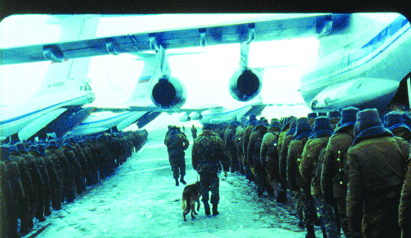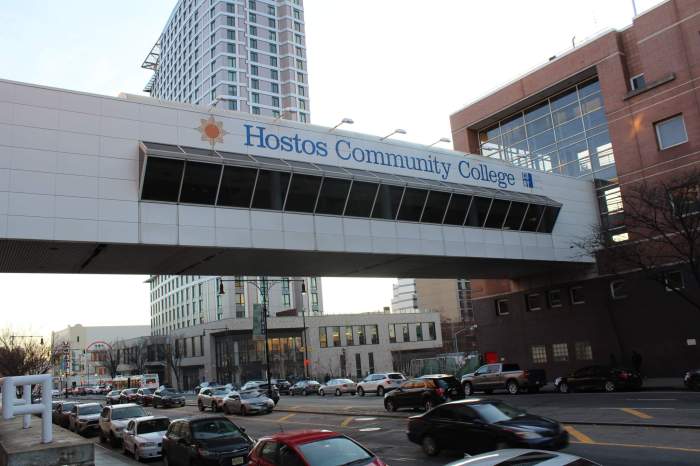High-flying phantasmagoria from young Russian provocateurs
Synchronize your watches—the hour strikes “4.” An instant sensation upon its premiere at the 2004 Venice Film Festival, Ilya Khrzhanovsky’s debut feature bagged a Tiger Award in Rotterdam last year and floored ’em at Tribeca. Now opening in a Gotham run, there’s no getting past this riotous, putrescent juggernaut—it must be confronted.
The son of Andrei Khrzhanovsky, one of Russia’s foremost animators, 31-year-old Ilya trained at VGIK under Marlen Khutsiev, creator of the Thaw-period masterwork “The Ilyich Gate” (1964). While young Khrzhanovsky’s chops are clearly abundant, “4” is a collaborative endeavor down to its grimy fingertips, principally with screenwriter Vladimir Sorokin, known for such coruscating novels as “The Queue” and the recent bestseller “Blue Lard.” Sorokin’s script for “4” was officially condemned for its wantonly coarse language and “disgusting” scenes; the film’s Russian release was delayed while Khrzhanovsky refused to implement censor-mandated cuts.
The filmmakers’ numerological riff belongs to a contemporary Russian milieu thick with occult preoccupations. Bookstore shelves and newsstands in cities and provinces alike sag with mass-market tomes on sorcery and the paranormal, astral explanations for prosaic events are traded on television talk shows, occult themes fuel blockbuster movies like “Night Watch.” This popular embrace of the fantastic has roots in a folk heritage traceable to Slavic paganism via early Christian Gnosticism, but its anodyne 21st-century iterations, ruthlessly satirized in “4,” tend to obscure salient political processes.
From a fortissimo overture, Khrzhanovsky brings on his principals and gives notice the ride won’t be restful. Oleg (Yuri Laguta), a saturnine wholesaler, first appears in a frozen warehouse piled ceiling-high with marbled carcasses. Sergei Shnurov, skipper of the punk band Leningrad, plays Volodya, a shifty piano tuner—one of several nods to Russian auteur Kira Muratova, among a host of influences. The blasé hooker Marina is essayed by Marina Vovchenko, whom the resourceful Khrzhanovsky discovered in a Moscow strip joint. Marina must shoulder much of the narrative, and the raspy, slightly maladroit Vovchenko grows on you like a favorite, frayed denim jacket.
At three o’clock one morning, Marina, Volodya, and Oleg converge in a Moscow pub run by a narcoleptic scarecrow, and in one drawn-out, virtuoso scene, each takes turn fabricating unlikely bios for themselves while nipping curaçao and brewskies. Oleg stocks the Kremlin with fancy mineral water and blue-ribbon vodka, and Marina is a marketing whiz currently promoting “tension reducing” air purifiers for corporate offices.
Whiskered, soft-spoken Volodya trumps them handily with the disclosure of his work in a super-secret government genetics laboratory, effectively a human cloning factory established decades earlier under Stalin. Not only have the “doubles,” as Volodya and his colleagues call them, wandered among us for years, but whole city districts have been silently cordoned to house them, so vast is their number. As Volodya unspools this ornately detailed scenario to Marina and Oleg, Khrzhanovsky incrementally tightens the staging into a pitch of suspense.
Short-fused Oleg seems bound for an antisocial rampage, but is bested by a quartet of orblike piglets that lampoon genetic modification in all its outlandish creepiness, before returning home to be henpecked by a dotard father who insists, “You can’t even imagine the power of hell.” Meanwhile, walking down a slush-caked street lined with display windows—40 percent off!—Volodya is randomly abducted by police, interrogated under suspicion of some unspecified crime involving a hunchback, and summarily sentenced to a labor camp.
It’s uncertain whether this is less enviable than what awaits Marina on a journey far into the countryside for the funeral of her sister Zoya. Trudging in a safety-orange coat across a phenomenally bleak landscape of endless barbed-wire fences and furrowed mud, Marina arrives mid-ceremony, greeted by her identical-twin sisters (Irina and Svetlana Vovchenko) plus a covey of shrunken crones ululating over the just-sealed grave. This entropic village derives its only income from homespun dolls with faces formed of masticated, dried bread, or “chewies.” Zoya, it turns out, single-handedly sculpted the dolls’ eerie likenesses; with no one to perform this task the grandams are totally bereft.
A mourning feast primes the pump for extended passages of churning grotesquerie. The village biddies, lusty wenches all, drink themselves into a cackling stupor, berating Zoya’s mangy boyfriend, mock-fellating the knit genitalia of the stuffed humanoid dolls, and pelting each other with food while spewing a torrent of blithe obscenities. Marina and her sisters repair for a sauna, and Khrzhanovsky shock-cuts from a gauzy view of their supple flesh to a close-up of gnarled hands carving charred pork hide—another feast, escalating into Bacchic striptease, with the hags fondling each other’s exposed mammaries. As Marina staggers out the next morning, one of the geezers, crashed on the floor, stirs long enough to ask, “Was my pig tasty?”
The censorship aimed at “4” is itself an element of spectacle; Sorokin has cultivated disrepute since the 1980s, and official opprobrium is to some degree overdetermined. In this case, however, the focus on “disgusting” material may conceal ire at the film’s truly incendiary suggestion of Putin’s use of forcibly conscripted penal brigades to wage the doomed war in Chechnya. Near the film’s end, in a vignette easily overlooked amid all the bedlam, the chalk-faced Volodya is glimpsed among uniformed phalanxes filing aboard military aircrafts. A dissolve from one plane’s takeoff into another, then another and the next, implies a monstrous apparatus herding conscripts off to slaughter.
gaycitynews.com


































